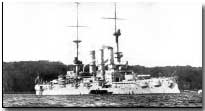Primary Documents - First German Report on the Battle of Jutland, 1 June 1916
 Reproduced below is the
first official German statement issued in the wake of the 31 May-1 June 1916
Battle of
Jutland - up to that point arguably the greatest naval battle in
history.
Reproduced below is the
first official German statement issued in the wake of the 31 May-1 June 1916
Battle of
Jutland - up to that point arguably the greatest naval battle in
history.
Although regarded by many as tactically a German victory - more damage was inflicted upon the British Grand Fleet than upon the German High Seas Fleet - strategically the victory belonged undeniably to the British. The German Kaiser, Wilhelm II, afraid of the dangers faced by his fleet, forbade them to engage the British in similar fashion for the remainder of the war.
Thus the German fleet remained in port while the British controlled to patrol freely, imposing an increasingly effective naval blockade upon Germany.
Click here to read the first official British report on the battle; click here to read German naval minister Eduard von Capelle's report; click here to read British Grand Fleet Commander-in-Chief Sir John Jellicoe's report; click here to read an account of the battle by a German sailor; click here to read a British memoir.
First Official German Statement on the Battle of Jutland, 31 May-1 June 1916
Berlin, June 1, 1916
During an enterprise directed to the northward our high sea fleet on May 31st encountered the main part of the English fighting fleet, which was considerably superior to our forces.
During the afternoon, between Skagerrak and Horn Reef, a heavy engagement developed, which was successful to us, and which continued during the whole night.
In this engagement, so far as known up to the present, there were destroyed by us the large battleship Warspite, the battle-cruisers Queen Mary and Indefatigable, two armoured cruisers, apparently of the Achilles type; one small cruiser, the new flagships of destroyer squadrons, the Turbulent, Nestor, and Alcaster, a large number of torpedo-boat destroyers, and one submarine.
By observation, which was free and clear of clouds, it was stated that a large number of English battleships suffered damage from our ships and the attacks of our torpedo-boat flotilla during the day engagement and throughout the night. Among others, the large battleship Marlborough was hit by a torpedo. This was confirmed by prisoners.
Several of our ships rescued parts of the crews of the sunken English ships, among them being two and the only survivors of the Indefatigable.
On our side the small cruiser Wiesbaden, by hostile gunfire during the day engagement, and his Majesty's ship Pommern, during the night, as the result of a torpedo, were sunk.
The fate of his Majesty's ship Frauenlob, which is missing, and of some torpedo boats, which have not returned yet, is unknown.
The High Sea Fleet returned to-day [Thursday] into our port.
Source: Source Records of the Great War, Vol. IV, ed. Charles F. Horne, National Alumni 1923
Russia mobilised 12 million men during the war; France 8.4 million; Britain 8.9 million; Germany 11 million; Austria-Hungary 7.8 million; Italy 5.6 million; and the USA 4.3 million.
- Did you know?
